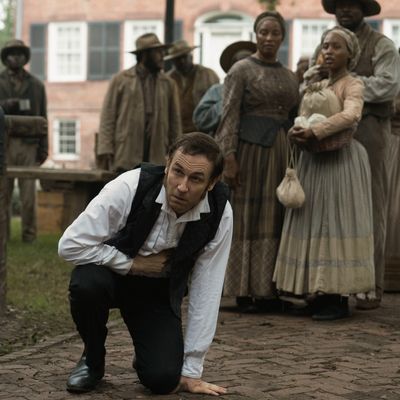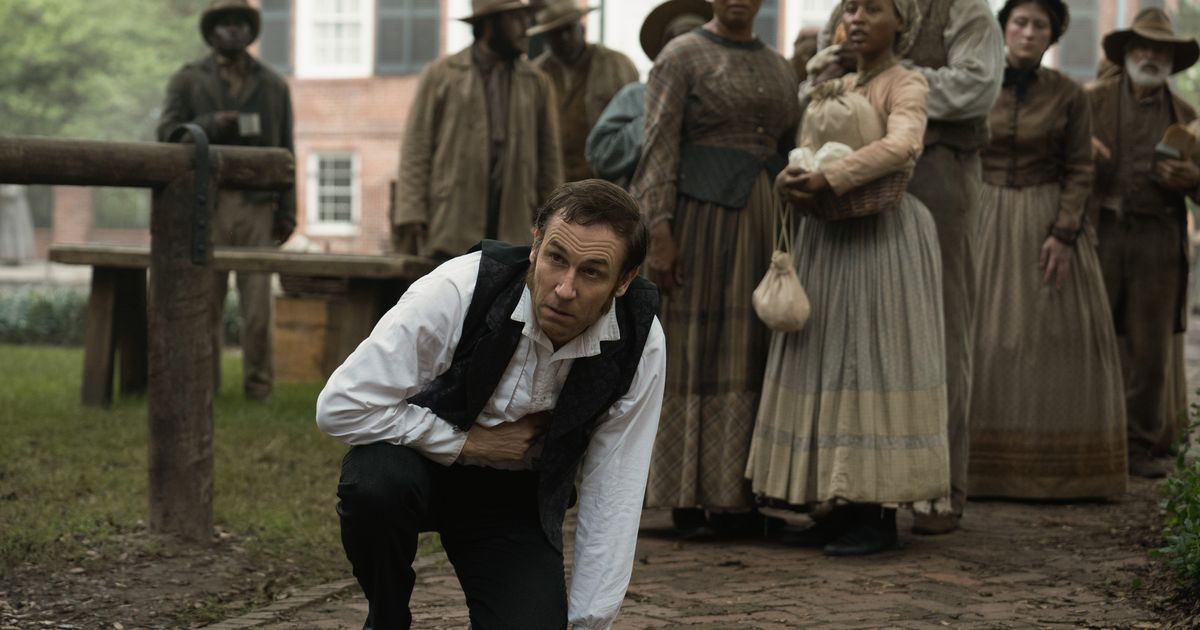
Manhunt
Let the Sheep Flee
Season 1
Episode 3
Editor’s Rating
Photo: Apple TV
John Wilkes Booth has seen the future, as this third episode of Manhunt opens, and it looks pretty great. Booth dreams of becoming the second president of the Confederate States. On some level he might know this is a fantasy, but the waking world brings delusions of its own, specifically thoughts of the fame and glory — if not the presidency of a restored Confederacy — that awaits him when he makes it to Richmond. He’ll publish his diary there and be greeted as the hero he knows himself to be after ridding the world of Abraham Lincoln. It’s going to be great, but first there’s the little matter of getting out of the backwoods wilderness, which he can’t do without Herold (whom he doesn’t seem to mind) or Oswell Swann (whom he reflexively hates as an unrepentant racist). But when he gets to Richmond, it will all be worthwhile.
Of course, the South Booth imagines no longer exists, and as Booth continues his escape, Stanton attempts to explain Reconstruction to new president Andrew Johnson. It’s pretty simple, really: Black people will be treated like citizens, and the former leaders of the Confederacy will be punished. Johnson claims to be into it — at least the punishing traitors part — and more receptive to Stanton’s ideas than even Lincoln was at first, as a flashback reveals. First, however, he wants Booth captured.
Booth’s not in Montreal, but that doesn’t make it irrelevant to his story. Confederate supporter George Sanders (Anthony Marble) is in Montreal, and that’s where reporter/double (triple?) agent Sanford Conover (traveling under the name “James Wallace”) finds him. Conover wants to collect the bounty on John Surratt, and Sanders green-lights giving him up, though they’re supposed to be allies. Conover’s going to have to work for it, however. Sanders tells him Surratt is in Montreal visiting “his father,” even though his father is dead. Hmm … Conover, it seems, is not that clever, but with a little torture, Stanton figures it out. His “father” is actually his “Father,” as in the Man Upstairs. He’s at the monastery where he trained to be a priest.
Meanwhile, Booth and Herold reach their destination but engage in a tense standoff with Swann in the process. They receive a warm welcome at their new shelter, which contains a “signal room” used by its owner, Samuel Cox (Thomas Francis Murphy), a member of the Confederate Secret Service who’s continuing to conduct a “silent war.” Cox considers Booth a hero and remains bullish on a Confederate revival, but he’s also a pragmatist. He knows Richmond is a mess and Confederate leaders are on the run, and advises Booth to go to Florida or Montreal. But for Booth, it’s Richmond or bust. So Cox sends him back to the wilderness to wait for someone called “the River Ghost,” led by Swann, who demands more money and reveals he’s only willing to put up with their hateful nonsense for as long as they keep paying him.
The legitimate capital of the United States has its own problems. When a group of Black Army soldiers that includes Private Cuffy Stevens (Christian Robinson) attempts to distribute food, a racist woman incites an incident that brings in a bunch of racist policemen. They kill Cuffy’s young cousin, Alec (Ja’Quan Monroe-Henderson), after wrongly assuming he’s stealing a horse. It’s Alec’s horse, but that doesn’t matter, and Stanton’s intervention comes too late. It gets worse from there: Not only does Johnson subsequently pardon the murderous police officer, but he goes back on his word to Stanton and declares amnesty for former Confederates and will encourage pardons for leaders who have been charged. Stanton and Johnson exchange words, but, in the end, strong arguments are all Stanton can offer.
Back in Montreal, Conover gets his man, tells Surratt he’s helping him escape, then pulls a gun on him and asks where Booth is. Bad move. Surratt overpowers him and escapes. It looks like Stanton is going to have to take care of this himself, against Ellen’s protests. In Montreal, Stanton has a tense exchange with a sneering Sanders, who tells Stanton that he and Johnson have “reached an understanding.” What’s more, Sanders has bought a newspaper, The Weekly. (Could misleading news influence public opinion? What a concept.) Pressing on, Stanton finds an incapacitated Conover, who tells him he can still catch the boat on which Surratt is escaping. Except Stanton’s too late; Surratt intentionally sank the boat before making his escape bound for Liverpool (and chartered by Sanders). There’s one other detail: Surratt left behind a trunk filled with costumes, and Booth’s name was on the manifest, which is the sort of clue that someone trying to fake Booth’s death might have left behind.
In fact, Booth isn’t dead, but he is cold and unable to start a fire lest he attract attention. Fortunately for him, the River Ghost shows up as promised with some supplies. That doesn’t include food for the horses, who start whinnying. And if you didn’t hate Booth already (and if you don’t, what’s wrong with you?), try having any sympathy for him after he kills a horse to keep it quiet. Herold may be, in Swann’s words, a lackey, but even he has his limits and sends his horse off into the night instead.
At Alec’s funeral, Cuffy offers Eckert a new lead. Cuffy was enslaved to Confederate Secretary of State Judah Benjamin, who felt comfortable using codes and decryption devices in Cuffy’s presence, assuming he would not understand what was happening, including a wheel Cuffy and Eckert believe might hold the key to finding the CSS officers. They’re right, too. After leading an expedition into a ruined Richmond, Cuffy brings Eckert to the gadget used to communicate in code. What he finds includes the words “come retribution,” which Stanton, when he receives word of it, suspects could be an order that confirms the Confederacy was behind Lincoln’s assassination. But, as Baker points out, he can’t prove it. Maybe he can prove Sanders funded it, but that’s going to be hard now that he’s up against Sanders’s propaganda machine and the emboldened Sanders himself, who receives the news of a likely pardon from Johnson with pleasure.
At least Mary Simms gets some good news in the form of the land grant promised to the formerly enslaved and the deed to prove it. But her brother’s warning that Johnson can’t be trusted to honor Lincoln’s plan and the way the episode keeps cutting to Sanders promising former Confederate leaders that they’ll be free, in Europe if not America, ends the episode on an ominous note despite that happy development.
• This episode was directed by John Dahl. Dahl broke through with some neo-noir movie gems in the ’90s, most notably Red Rock West and The Last Seduction. He then went on to direct Rounders and the waiting-to-be-rediscovered Joy Ride. He mostly works in TV now, focusing on prestige shows like For All Mankind, The Americans, and Justified.
• Can the Stanton marriage be saved? Well, yes. Historically, they stay together. But undoubtedly, Stanton’s poor health and determination to keep working anyway was a source of stress. That does not seem like a tremendous leap of the imagination for the show to make.
• This episode continues to use flashbacks that complement the present-day action and provide historical context, like the meeting between Lincoln, Stanton, and Frederick Douglass (Elvis Nolasco), in which the three discuss Black soldiers serving in the Union Army. Lincoln needs some swaying, and the scene continues Manhunt’s depiction of Lincoln as a leader who made decisions by listening to the arguments of others — and of how history might have changed had he made different choices at any step along the way.
• Cuffy and Alec belong to Company G, a real Civil War regiment. They’re fictional characters who take their names from contemporaneous members of showrunner Monica Beletsky’s family. In tracing her genealogy, Beletsky also found a great-great-uncle who had been a Black soldier in the Union army.
• Company G is under the command of Sergeant Powhatan Beaty (Joberde Metellus). The real Powhatan Beaty led an interesting life. Born into slavery in Richmond but educated in Cincinnati, he studied acting, worked as a cabinetmaker, and was likely pressed into service to help shore up Cincinnati’s defenses. He then chose to continue serving in the Union Army, where he saw quite a bit of combat before returning to Cincinnati after the war. There, he became a lecturer, playwright, actor, and director. He married Henrietta Vinton Davis, the most acclaimed Black Shakespearean actress of the era. They frequently performed together, and their son, A. Lee Beaty, became an assistant U.S. district attorney and served in the Ohio legislature.
